Posted on

The first ever Iowa History Conference was held in early June at the State Historical Society of Iowa in Des Moines. It was sponsored by the State Historical Society of Iowa and University of Iowa and featured scholars, students, museums, directors, and archivists. There were a wide variety of topics and panels at the conference and I particularly enjoyed the panel on Indigenous history in Iowa, and the history of indigenous agriculture in Iowa.
I presented on a panel entitled "History Education in Iowa," alongside the Social Studies rep from the Iowa Board of Education, Stefanie Wager, and a professor of religious studies at UNI, Mike Graziano. We all shared the various methods and approaches to encourage students to engage with history in general and history in Iowa, specifically. I shared about the role of primary sources and helping students to figure out how to trust sources through active historical inquiry. I also championed the role of local history to connect with history sources outside of the classroom through field trips, oral history projects, local museums, and archives. We had a lively discussion between panelists and the public who attended the panel. I loved the opportunity to engage with more local history ideas and to network with various people connected to history from around the state.
The Iowa History 101 series is a 60 minute online learning series tied to a topic in Iowa History. There is a wonderfully diverse array of topics and people that have been covered in the series, put on by the State Historical Society of Iowa. The webinars are free and open to the public and after a presentation, there are questions and discussion with the audience. I presented on Iowa Summer camps, which is part of my larger scholarly work on the history of evangelical summer camps in the post World War II era. In my research, I am animated by the question, for Christians: how should you pass your faith to next generation in a faith community that requires some sort of personal commitment/conversion experience? I think studying summer camps is a great way to get an answer to that question, and I had a wonderful experience with the team from the State Historical Society and great questions from the audience as well.
- RK
Learn more about the M.Ed. in Teaching History program at Northwestern.
To learn more, click this link for the webinar from State Historical Society of Iowa and the Iowa History 100 Series.
About the author
A Northwestern College graduate, Dr. Koerselman earned a master’s degree in history and political science from Iowa State University and a doctorate in United States history with an emphasis on gender and religion from Michigan State University. Before joining Northwestern's faculty, she was an assistant professor of history at Oklahoma Baptist University.
Posted on
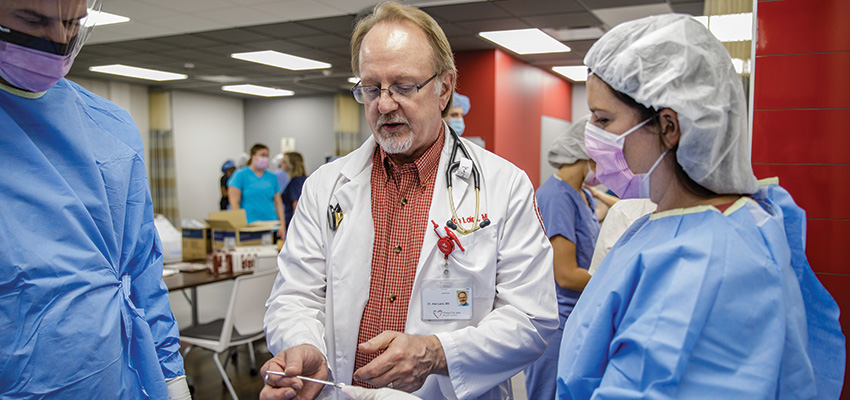
I have had the privileged of watching several PA classes being transformed from laypersons to professionals ready to enter practice. That is not to say they have learned all they need to know; even 4 years of medical school can’t do that. But they are ready to become part of a healthcare team and enter their respective area(s) of practice. There they will have another learning curve of 5 – 7 years to be “comfortable” in all they do.
So, what is it like to be a PA-S (student) and be “transformed”? Of course it is different for each person. But the best analogy I can come up with is the chrysalis of a butterfly. Yes, it may be an over-used example. It certainly does not apply to just becoming a PA-C (clinician). And I have no idea how much self-awareness the caterpillar has in its transition; but I do think it is helpful to think.
You probably remember the process from a grade school experiment. The caterpillar, after reaching maturity, picks a branch, attaches itself, forms the chrysalis and eventually emerges looking quite different. So too, the PA student is admitted to a school, settles in, and begins the change process.
Remember watching that hanging object, day after day, wondering when and if the emergence would take place? At that young age we were not aware of what was going on inside. It seemed like nothing was happening! But, a study of the process, reveals a lot is happening. Parts are being catabolized (broken down and digested) for anabolism (the growth of new structures). The chrysalis is a cramped space. Because of the breakdown and growth, it must be hot. I suspect all that change hurts (if caterpillars / butterflies feel pain). It certainly can’t be comfortable. And so, the PA student in their classroom and study-time chrysalis, learns to apply old knowledge, to acquire and grow new knowledge, and turn that knowledge into wisdom with application. Things have to be connected to understand the human body as a whole. And then they must be connected again in new ways to understand a disease processes and how it affects the body in individual systems and as a whole. Trust me, that is not comfortable. The brain can feel cramped as it is “expanded” every day with new knowledge. Time that once was leisure or recovery time, becomes study time. The previous life becomes “consumed” to make room for a new life as a provider of medical care. It may look like “just going to school”, but there is a whole lot more going on. And just like the change from caterpillar to butterfly doesn’t take a break until the new organism emerges, neither does PA school. We were warned not to “help” the butterfly out of the chrysalis. We could injure it or cause it to be too weak to fly, since the struggle out of the chrysalis is an integral strengthening process. So too, may parts of PA school are necessary, even if they cause discomfort.
Remember also, that the new butterfly didn’t float off right away. It had to dry and learn to use those wings. The PA is not yet ready to “fly off” to practice. They need to learn from other clinicians and mentors how to use all that new knowledge and wisdom. And so, they spend time with different specialties to strengthen those “wings” in preparation for solo flight one day after graduation.
Now this wasn’t written to make you feel sorry for all the discomfort a PA-S must go through. Nor was it written to glorify a PA-C as a beautiful butterfly that was uniquely fashioned for the world. It was written as encouragement. Encouragement to stay the course. Does the training stretch you? Good, it should. Does it “hurt” at times? Yep. The instructors don’t mean for it to hurt, but as they say in sports, “No pain, no gain.”
If you have a loved-one in PA school and you see them struggling, support them. You may not be able to completely understand, but you can encourage them. And don’t try to open the chrysalis for them or push them off the branch too fast. That only leads to a failure to fly.
Stay the course, work the process, the transformation will happen – even if it is not comfortable. And while all who read this may not agree with me; I believe Someone called you to this. He has called you to be faithful, even when the path ahead is only clear enough for the next step. He will never leave you nor forsake you, even when the path takes a sharp right, a sharp left or doubles back on itself.
Learn more about the Master of Science in Physician Assistant Studies program at Northwestern.
About the author
Dr. Alan Laird ’82, served as the founding medical director for Northwestern's physician assistant program from 2019-22. Prior to his retirement, he was a board-certified family practitioner at the Orange City Area Health System where he served as the chief medical officer, handled outpatient care at a satellite clinic, as well as inpatient care, and provided emergency room coverage. Dr. Laird is a Northwestern College graduate who earned his medical degree from the University of Iowa. 
Posted on
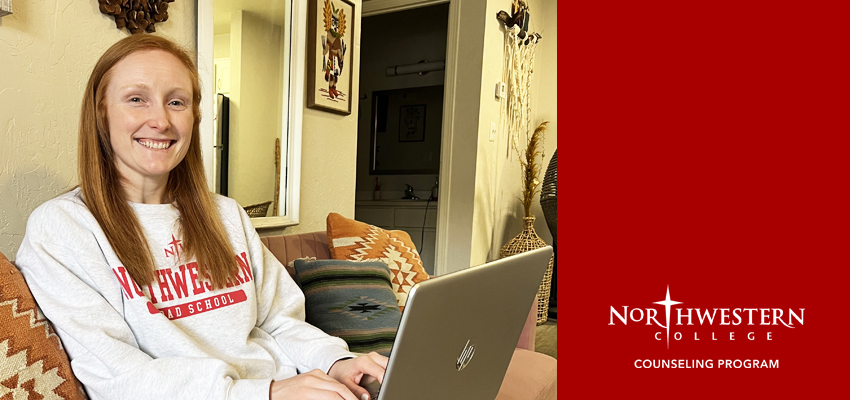
Are you considering starting your master's degree, but it never feels like quite the right time?
Are you a current graduate student wondering, can I really manage this all? Michaela shares her experience in the M.A. in Counseling program – and encouragement to go for it!
A Note for Graduate Students–You Can Do It!
If you’re reading this and questioning if it’s the right move, the right time, or the right place to begin a master’s program, take this as your sign to say YES to a wonderful and unexpected adventure.
My name is Michaela and I’m a graduate student in Northwestern’s Clinical Mental Health Counseling program. Before I officially began this journey I already worked full-time, coached high school soccer, and was a social individual. My biggest fear was not having the time or energy to survive the program.
"My mindset began to shift from “IF I finish this program” to “WHEN I finish the program"
Here’s the thing though – when you feel a strong sense of calling for your life, you’ll do whatever it takes to make it happen. While it was an adjustment in the beginning, I have learned how to balance work, my social life, and school so it feels like a perfect fit. On top of that, the nature of the program (exclusively online) has allowed me even more opportunities to tweak my schedule as needed and still complete assignments each week. My mindset began to shift from “IF I finish this program” to “WHEN I finish the program.”
I cannot say enough good things about Northwestern, my professors and classmates, and my overall experience in the counseling program so far. The amount of support I receive each week from others in the program is astounding and it keeps me motivated to work toward my goals. So, if you’re still wondering, say YES today. Start your journey now. You will not regret it.
Posted on

So, you’re thinking about becoming a counselor. Amazing, you are needed! A career in helping is rewarding and fascinating. Your career will focus on understanding human behavior and promoting positive change in individuals, families, or groups.
I will share a few insider secrets with 5 more benefits of the profession!
- Freedom
Be your own boss. If you choose to start your own private practice, you can set your hours. Work when you want to work. - Fulfilling
Learn and experience a deep appreciation for humanity. See God’s miracles firsthand as you guide people toward healing and holistic health.
- Never Grow Bored
Choose a specialty that excites you. Then, later in your career, choose a new specialty that excites you all over again! - Self-Awareness
This is a profession where you ARE the “tool” that is used to help the client. Much like a surgeon must keep her scalpel sharp…a counselor must keep herself AWARE. That is, you have to work on your “issues” and continue your personal growth. Balance and acceptance are key. - Mandatory Self-Care
As a counselor, you will have to practice mandatory self-care. This is the holistic kind that requires setting boundaries, self-compassion, and having down time…just to mention a few.
I’m excited you’re preparing to join the counseling team! There will never be a dull moment unless it is one you’ve scheduled in your calendar.
Learn more about Northwestern's online M.A. in Clinical Mental Health Counseling and School Counseling programs.
About the Author
Dr. Julie Merriman is the program director for Northwestern's online Master of Arts in Mental Health and School Counseling programs. Dr. Merriman’s background in the mental health field ranges from running her own private practice since 1999 to being a school counselor to running an adolescent
program to creating a school for severely emotionally disturbed students to serving as
a director for Abilene Psychiatric Hospital. She currently maintains her private practice in Meridian, Texas.

Posted on

Research has shown that a child’s spiritual foundation and view of the world is developed within their first six years of life (Gillian, 2007). When children hear consistent messages about Christianity at home, at church, and at school, it solidifies their understanding of God and they can practice His teachings in a variety of settings. Early childhood educators help to share these messages and model behaviors for young children in their care.
Master of Education instructor and early childhood consulant, Dr. Jennifer Sturgeon shares applicable lessons or ideas for early childhood teachers working in Christian schools and in a public school setting.
While engaging in class discussions at Northwestern College, graduate students who work as early childhood educators shared their experiences of working in Christian schools. Stories shared included kindergartners pointing out God’s creations while on a nature walk, preschoolers praying for a classmate who was at a grandparent’s funeral and creating artwork representing Heaven, and first graders playing a Bible detective game to better understand the Word of God.
When reflecting on their experiences in the classrooms, these early childhood educators pointed out a strong positive impact of faith-based education on academics and behaviors. I decided to investigate this further and had the opportunity to gather input from focus groups of educators from grades Pre-Kindergarten to Grade 2 on the positive impact that faith-based education has on both individual students and the overall culture of their environment.
Developing Faith-Based Routines
When we think about our youngest learners, students in preschool or in the primary grades, they often do things out of routine and habit. There are certain habits that we have as Christians to help build and strengthen our faith. Praying is modeled for children and becomes a habit early on. Our youngest learners may not fully understand or comprehend the significance of Christian values, however, we do not need to wait until they fully understand (Brim, 2016). The teachers that participated in the focus groups mentioned that they are setting the stage for the child’s future and helping them to develop those faith-based habits to prepare them for when they reach an age where they can begin to reflect on and understand the different aspects of faith.
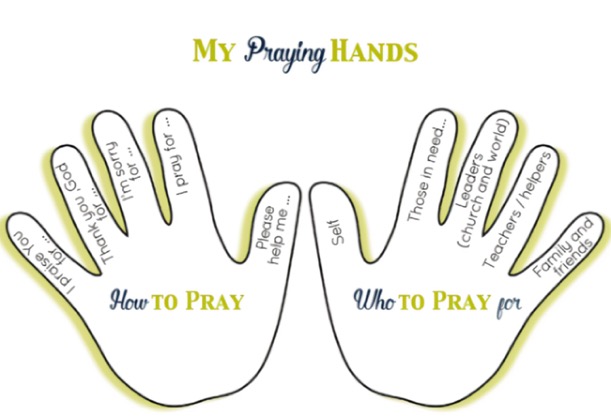
Teachers include prayer as part of the school day and teach children that through prayer, we can communicate with God. Children are encouraged to offer a silent prayer to God each day and are taught the importance of sharing a prayer with peers in their classrooms. When our youngest learners pray, it strengthens their faith and unity and helps them know that they are one before The Lord (Covey, 2018). Prayer is also used to help children take a deep breath, calm down, handle social situations, and complete challenging academic tasks.
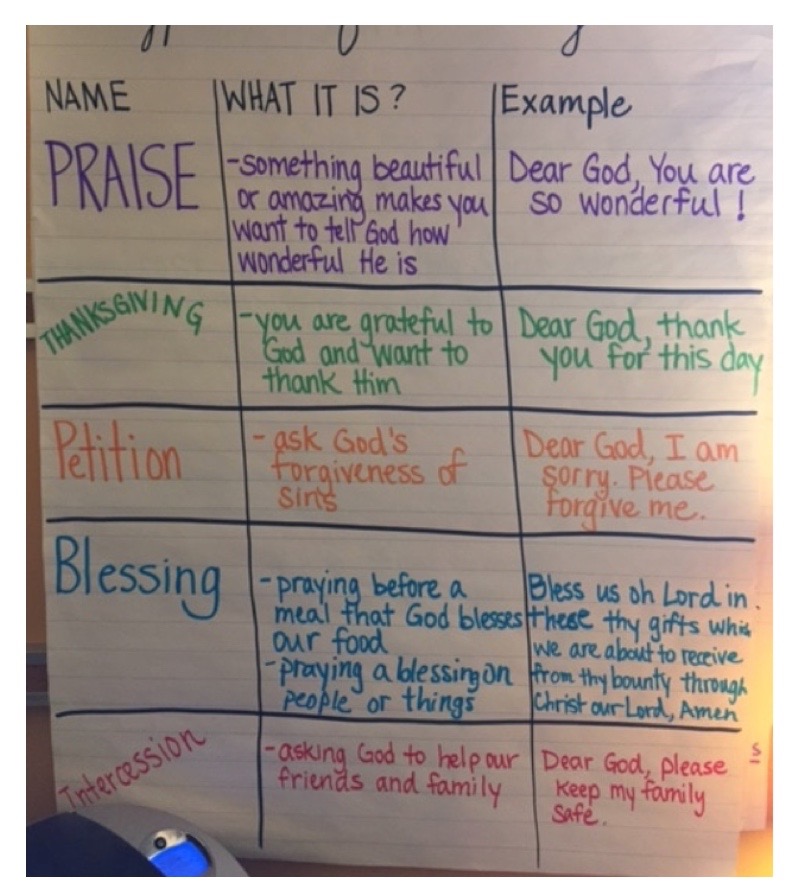
The children also take on different roles and responsibilities related to prayer to help take ownership of their faith. For example, classroom jobs assigned to students include setting up the daily prayer space, writing out the petitions, and choosing the Biblical story or song.
Academics
According to the Council for American Private Education, students who attend religious schools score at an academic level about 12 months ahead of their counterparts (2020). This begins with the strategies used and the curriculum implemented at an early age. After listening to the teachers in the focus groups discuss academics, it became clear that in faith-based programs or schools, academic achievement was a priority at a young age. There were consistent findings that the focus was on preparing children for the next grade level and beyond.

The educators stressed that religion and faith-based practices can be effectively embedded using an interdisciplinary approach. There are countless ways to include faith in all areas of the curriculum. Several examples related to literacy were shared. One teacher described an activity that they did related to descriptive writing. Each student created a Saint Journal and wrote about the characteristics of the saints and then shared their writing with their classmates. Another example focused on teaching the literary elements, such as plot, characters, story sequence, and conflict, and how teachers can use stories from the Bible and have the students draw or write in response the story and the lessons taught.
In addition, the teachers spoke at great lengths about how the students’ talents and gifts from God are promoted, as well as individualization of learning styles. Those teachers who work in early childhood settings have a wide range of children enter their classrooms, with a variety of needs, skills, and background experiences. They focus on the unique potential of their students and modify the curriculum to meet the needs of all students and support each student to reach their potential. They felt that in faith-based settings, the educators were truly there for the students and were willing to go above and beyond. This led to more of a collaborative spirit and everyone coming together to help the students that needed extra assistance.
The focus group participants also noted that the students in faith-based classrooms appeared to be more comfortable taking risks and speaking up in the large group because a culture of kindness and love that had been created in their classrooms. They noted that students were more willing to raise their hand to ask and answer questions without embarrassment or fear. When working with a partner or in a small group setting, peers were helpful and assisted their classmates without judgment. They noted that these peer interactions gave students more confidence.

Positive Social-Emotional Skills
The teachers shared common themes that connected faith-based learning to positive social-emotional skills, a culture of kindness and collaboration, and a safe learning environment. Christian morals set children up for a lifetime of success. Between the ages of two and five, children begin to display morally-based behaviors and beliefs (McKay, 2014). When children are in settings where they are taught these morals, their social-emotional skills and their daily behaviors are impacted. The teachers who explicitly taught Christian values and spoke openly about faith daily in the classroom saw an increase in positive social-emotional behaviors when they compared their experiences in faith-based classrooms to other teaching environments.
In faith-based classrooms, early childhood educators serve as role models in faith by teaching the values of Christianity, establishing trusting relationships where children can reflect on actions and learn from mistakes, and encouraging kindness and friendship (Holloway, 2006). The teachers noted that most of the children in their faith-based classrooms excelled at turn-taking, sharing, and using of kind manners. They shared that children as young as three-years-old could manage their emotions and problem solve when frustrated or upset. They attributed this to both teaching those Christian morals as well as children feeling they are cared for and safe in their classrooms. Children are instructed to calm down, take deep breaths, and pray. They are respected as valuable members of the classroom and are taught how to handle their emotions in a constructive way. The teachers in the classroom model appropriate behaviors and guide them through the process.
Culture of Kindness and Gratitude
Learning about God and listening to Bible stories at an early age helps children to develop empathy (Oswalt, 2021). This increases their understanding of other’s perspectives and leads to more productive and positive communication. The graduate students mentioned that children are taught forgiveness at a young age. We all sin, and everyone makes mistakes, but we must forgive one another.
In faith-based classrooms, children are taught to live like Jesus. At a young age, students are taught about gratitude and focus on being thankful for what they have. Through a variety of projects, they provide service to others. A common theme shared was service-based learning projects, in which the children collected donations for others, created art for others, or did a variety of good deeds around the school.
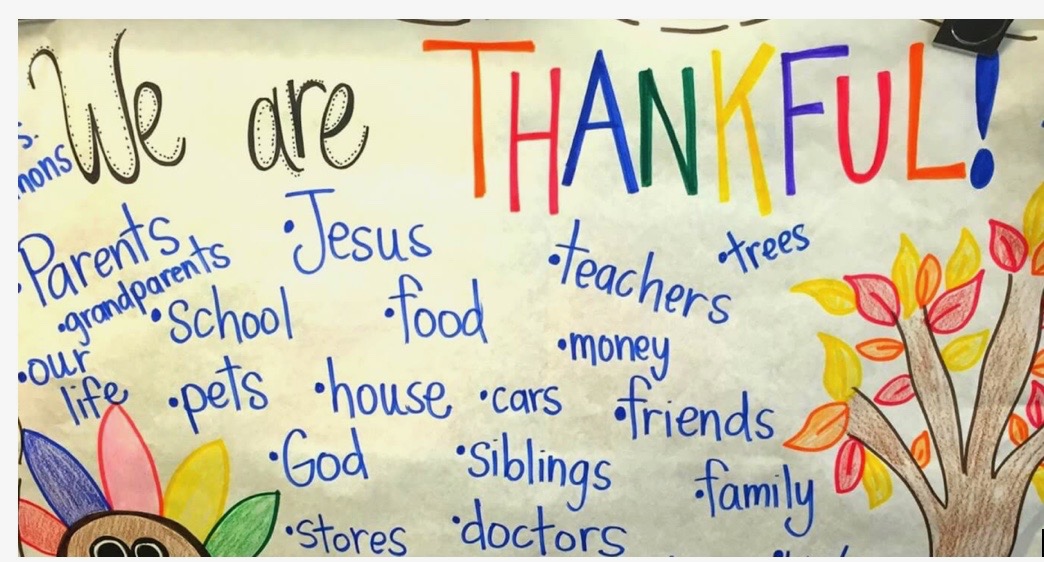
Safe learning environment
Faith-based early childhood classrooms provide our youngest learners with a safe emotional and spiritual environment. Children are taught to be respectful and to love one another and conflicts are discouraged. The children are taught that bullying is not kind and practice different ways to solve problems as they arise. The teachers in the focus groups mentioned that students are consistently allowed to be themselves and to express their ideas freely without being judged by their schoolmates or teachers.
Specifically mentioned were the children who had experienced high levels of stress and trauma in their lives. Teachers shared that part of creating a safe environment included teaching children to trust in God, which led to less anxiety in the classroom setting. Young children experience big emotions. One shared a story where the child who had experienced several challenges came to school crying and the difference it made when during their opening routine when the teacher asked for petitions, someone prayed that she had a better day.

Although the majority of the focus group participants were employed in faith-based settings at the time of the discussions, the consensus of the group was that these values can still be instilled in our youngest learners in a public-school setting. When teachers cannot lead the class in prayer or directly speak about Jesus and His teachings, they still find ways to model kindness, compassion, and other key values from the Bible.
About the Author
Dr. Jennifer Sturgeon is a Master of Education Instructor in Northwestern's online M.Ed. program and consults with administrators and teachers across the country who are using curriculum and assessment materials produced by Teaching Strategies, LLC, and trains staff on the best practices for early childhood education.

Posted on

This blog post was originally published on the Region 13 Education Service Center website.
Educators know the difficulties of the summer slide—the phenomenon where students lose significant gains in math and reading over the summer months. But now, research is coming out on the devastating effects of the so-called COVID-19 slide. We must pay attention to the informal and formal student data surrounding the implications and impact of the COVID-19 pandemic and what we can do to address it.
According to a research brief from NWEA (2020), “Policymakers and educational leaders have the unenviable responsibility of making difficult decisions well into the 2020-2021 school year and beyond. Now more than ever, we need school data to inform evidence-based policies to support our students, teachers, and families on the path to recovery” (p.2).
As leaders, we must take this current information and begin to plan with our teams and stakeholders, at whatever level, to map out how we are going to address the areas of significant gaps in learning that students are currently enduring.
In a recent presentation from the Department of Education called, Learning in a Pandemic, I heard some fascinating statistics on the state of education in the US. Let’s dive into the school data and discuss some takeaways. But remember that with any data analyses and interpretation, there are always multiple variables and extenuating circumstances. So we must use caution when making practical, short and long-term decisions.
COVID-19 Impact Data
In the COVID-Sim project research study, Dr. Macke Raymond, the Director of CREDO, compared fall 2019 student data with fall 2020 student data from the 20 states in this simulation project. It estimated what students would have learned had COVID-19 not occurred and the COVID-19 impact on learning, with help from the NWEA.
Math Losses vs. Reading Losses
They found that learning losses in math were greater than reading in every state. They hypothesized that this is due to the fact that we use reading (language arts) in our day-to-day lives more frequently.
Equity Effects
When comparing the loss estimates between high-minority/high-poverty schools and low-minority/low-poverty schools, they found that the first group has the largest amount of learning loss and the second group has the smallest.
Dr. Macke Raymond stated that “students who were already at the back of the pack, are the ones who had the largest impact, and are being moved even further back relative to the impacts for other students.”
So COVID-19 magnifies pre-existing achievement gaps. The effects are inversely related to overall achievement: students with lower achievement have greater losses. This means that we can no longer assume common starting points and fixed pace of learning.
Learning Loss Based on School Attendance
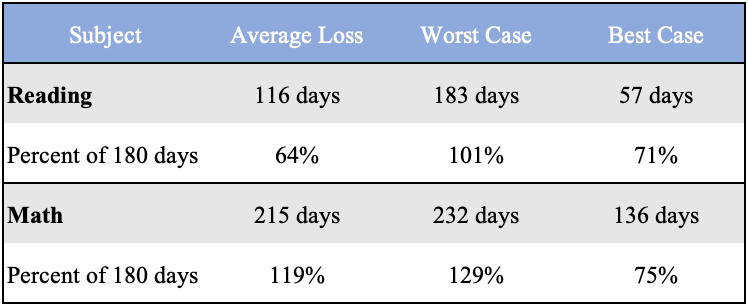
This graph represents students from the 20 states examined in the study attending the traditional 180 days of school and their learning loss or not attending the school over that school year. For example, the average loss of learning was 64%, or in other words, as if they had not attended school for 116 days of reading instruction. With math, the worst-case scenario was 232 days of loss of learning for some students (as if they did not attend school for 232 days at this time).
Recommendations Based on Student Data
It’s hard not to feel discouraged by the student learning loss and the widening achievement gap. But knowing what we’re up against can help us as we plan for the future. The presentation by Dr. Ailiyah Samuel, Senior Fellow of Government Affairs and Partnerships, offers some suggestions.
Academic remedies will likely take years, but this is only part of the equation. We will also need new approaches to schooling and the new or different use of teachers. For example, having a concentrated, expert teacher of master content can ensure students are meeting the learning objectives. There could also be a wider range of school setting options such as virtual, blended, one room with multi-ages, etc.
Furthermore, the need for assessment has never been greater, as even the best students will have up to a 50% loss in learning. A lack of data on students in underserved communities also makes assessment a key component in getting back on track.
Planning for the Future
When making plans to combat the COVID-19 slide, be sure to have at least a three-year lens on everything from technology to finances. A study in Argentina during the 1980s teacher strikes found that the negative effects of students missing school followed them into adulthood and had a disproportionate effect on low-income students. This information can also help us make sure we are allocating resources equitably so that all students can recover from the learning loss.
In addition, examine current teacher certification and reciprocity across districts and states (i.e. we could access “expert teachers” from one state for another state and not be held back by “regulations”). Additionally, place an increased focus on math (as it is cumulative) and brainstorm how to make it a day-to-day activity like reading.
Personally, you can watch the complete webinar from the Department of Education and review the concrete steps of 5 ways to lead and adapt through a crisis (from the Center for Creative Leadership). Don’t forget to ground your work in Radical Empathy. “Radical empathy is a concept that does exactly that – it encourages people to actively consider another person’s point of view in order to connect more deeply with them.” ~Jacqui Paterson
And finally, just begin. There is no perfect answer to teaching in wake of the COVID-19 pandemic, but looking at student data and taking action is crucial for our students’ success.
Tell us what you think!
Tweet to @NWConline
About the Author
Dr. Wendy Kerr is a Master of Education Instructor in Northeastern's online M.Ed. program and works as an Administrative Specialist for Educator Evaluation and Leadership at ESC Region 13 in Austin Texas.

Posted on

Recently I heard a sermon about rejoicing with those who rejoice and weeping with those who weep (Romans 12:15). My fear of missing out (FOMO) spikes when I see social media posts of my vacationing friends and this was a good sermon for me to ponder. It is a lesson I have tried to teach my own kids in my own house. Among my six kids, there hasn’t always joy when one kid gets to choose the breakfast cereal or sadness when one kid gets hurt on the new skateboard.
I enjoy visiting with new teachers and recently I had a conversation about classroom management with a new elementary teacher. He has a large and busy class. He was telling me that behavior management has been the biggest challenge for him. The behavior exhibited by one child is particularly concerning. This child often thinks he gets the short end of the stick or another child is the teacher’s favorite. He complains that others get better seats, more time, a better deal in general. He disrupts the class often.
The teacher told me about the interventions he was trying. He had given the child frequent breaks; preferential seating, including a standing desk; fidgets; a handheld gaming device to take on the bus. I thought that his plan sounded good. At the end of the conversation though, the young teacher asked, “What will the other kids think of him being rewarded for his behavior? Won’t they want to act like that too?”
The question stopped me up short. Did the accommodations seem like a reward? Would the other kids in the class begin to act out so they too could have their behavior “rewarded”?
What do you all think? I know behavior can be contagious, but I do not think that kids without behavior issues will start misbehaving to see if they too can have accommodations. Will all of the kids want fidgets? Perhaps. Will all the kids need fidgets? Probably not. Teaching positive behaviors is difficult for all of us, especially for new teachers.
I taught my own kids a little song when they were little. I sang, “When good things happen to people we love we are…and then I would point to them and they would say GLAD!” We would continue by saying, “When bad things happen to people we love, we are SAD!” My goal was to teach them to rejoice with those who rejoice and weep with those who weep. I hope that teachers can do that too. Can we create communities where we all want the best for all kids in the class?
Tell us what you think!
Tweet to @NWCOnline
Teaching positive behaviors is difficult for all of us, especially for new teachers.
— NWC Grad & Online (@NWCOnline) February 15, 2021
How do we create communities where we all want what's best for all in the class; what do you think? @heits1 https://t.co/pUgmMURcGC
About the Author
Dr. Heitritter currently serves as a special education strategist with the Northwest AEA. Prior to her retirement from Northwestern, she served in many full-time roles including department chair, licensure official, and professor of undergraduate and graduate education courses. Before joining Northwestern's education department, Dr. Heitritter served as a language arts consultant and taught at both public and Christian elementary schools.

Posted on

Parker Palmer, American author and educator wrote in his book The Courage to Teach: Exploring the Inner Landscape of a Teacher’s Life, “I am a teacher at heart, and there are moments in the classroom when I can hardly hold the joy. When my students and I discover uncharted territory to explore, when the pathway out of a thicket opens up before us, when our experience is illumined by the lightning-life of the mind-then teaching is the finest work I know.”
This is my first year back in K-12 education after many years as a teacher educator at Northwestern College. I am working as a learning strategist and the schools I serve have been open for in person learning since August. The educators I work with are universally grateful to be back learning in person with kids. In fact, Covid has made it so teachers get almost more time with their students than before the pandemic. Kids come directly to their classrooms when they arrive at school. They stay in their own classrooms all day. Specials are delivered in the classroom so as to reduce exposure. Teachers spend any breaks they find sanitizing. They take their own students out for recess to limit contact with other classes. They contract trace after exposure. They arrange their room and change their instructional practices to keep kids as far apart as possible. The pandemic has certainly presented teachers and students “uncharted territory to explore”. Sometimes these challenges have been joyful, but for many educators, the pandemic-induced uncharted territory has been stressful.
Still, through the stress, the courage and strength that I see every day from the teachers and students I work with has been incredible.
Teachers have faced the extra and challenge with the knowledge that learning in person depends on their work. Teachers have taught kids virtually and in-person simultaneously. They learned new technology and deployed it as they learned it. They have fostered incredible community within their own classrooms. They are surviving a pandemic with their students and together they are building memories that will last a lifetime.
In the same chapter, Palmer goes on to say, “Teaching, like any truly human activity, emerges from one’s inwardness, for better or worse. As I teach, I project the condition of my soul onto my students, my subject, and our way of being together.” Well, Mr. Palmer, if it is true that teaching holds a mirror to the soul, I can answer that the soul of the teachers I see is just fine. In fact, the condition of the soul is so fine, it is joyful to see.
Palmer, P. J. (2017). Courage To Teach: exploring the inner landscape of a teacher's life - 20th anniversary edition. JOSSEY-BASS.
About the Author
Dr. Heitritter currently serves as a special education strategist with the Northwest AEA. Prior to her retirement from Northwestern, she served in many full-time roles including department chair, licensure official, and professor of undergraduate and graduate education courses. Before joining Northwestern's education department, Dr. Heitritter served as a language arts consultant and taught at both public and Christian elementary schools.

Posted on

Kari was nominated by her faculty as a student who constantly sought to better her practice while exhibiting the key pillars of Northwestern Raiders. Her dedication to high-quality work and positive, faith-filled peer interaction is something to be emulated. Kari's journey included unexpected hardship as she underwent cancer treatment while continuing her master's degree and teaching - and handled it all with a grace that is deeply inspiring.
We celebrate Kari, 6th-grade teacher, mom, wife, teacher leader and breast cancer warrior.
She earned her Master of Education in Teacher Leadership.
In the fall of 2018, I made the decision to finish my master's degree online. After searching and reaching out to many colleges, I knew right away that NWC Online was the best fit for me. I am a 5th/6th-grade special education teacher at Okoboji Middle School, teacher leader, wife, and mom. Juggling all of that was going to be difficult. What I wasn’t prepared for, was a diagnosis that would throw my life a curveball. I finished the Fall term and part of the Spring term with a breeze. That all changed in May. I felt a lump one morning by chance. Due to family history, I got into the doctor that morning. What followed was a series of events that led to a Stage 3 Breast Cancer diagnosis.
I reached out to my professors and advisor right away to let them know my circumstances.
They are the reason I kept moving forward with finishing out my master's degree while also receiving treatment.
Their faith, compassion, and understanding gave me hope that I could reach this long-term goal of mine. My family was my rock throughout my diagnosis and continuing my education. My husband took on so much to allow me time to work and research. The boys’ grandparents were our angels that kept the boys for most of the summer while I received a chemo that was hard on my body.
It was through my online classes that kept my mind focused and distracted from my disease.
In the fall of 2019, I was able to continue teaching part-time. I taught 3 days a week due to chemo treatments and a day of rest. My colleagues, administration, and students always took care of me. I was showered with love, kindness, cards, gifts, food, and prayers throughout my journey that kept me going strong.
I am so thankful for all of the people in my life that gave me support, inspired me to keep fighting, and motivated me to continue moving forward with my degree.
Because of my education through Northwestern, I was able to pause and reflect on my career and change my approaches as a teacher and leader. The classes challenged my thinking, faith, and instruction. Going forward, my mindset has shifted to a more open-minded approach as I work alongside other teachers to meet our students’ needs. My experience through Northwestern was wonderful. What I loved most about my experience was how each of my classes challenged my faith-based practices in and out of the classroom.
The advice I would give other educators considering the same program is to be prepared for excellence. Build relationships and make connections in each of your classes to open up your career to more possibilities. Most importantly, be willing to try new things, accept challenges, and make mistakes as you learn and grow.
Currently, I am a 6th-grade Language Arts and Social Studies teacher at Okoboji Middle School. Previously I taught Special Education for 13 years. What I love most about my job is building relationships with students. Making connections with students is such a beautiful thing and changes how I approach my instruction to meet the needs of my learners.
Posted on
Dr. Poornima D'Souza and colleagues are spreading hope, kindness and cheer as they deliver meals and educational materials to students in the Sioux Falls school district. Who says you can't also have a little fun during a pandemic!
Her advice for educators is to focus on building relationships. Watch her full video below.
Dr. Poornima D'Souza works with students and parents in the Sioux Falls school district as a school-parent liaison. As a Parent Educator and as a liaison, she provides immigrant families with knowledge of the school system and academic programs and supports the adaptation of immigrant families into a new and alien culture. She helps students, parents and teachers celebrate the beauty of diversity and multi-cultures.
She also teaches graduate courses in Northwestern's online Master of Education program. If you're interested in taking classes with Dr. D'Souza, explore our upcoming online graduate education courses or email online@nwciowa.edu.
She shares some helpful resources from Parent University:
